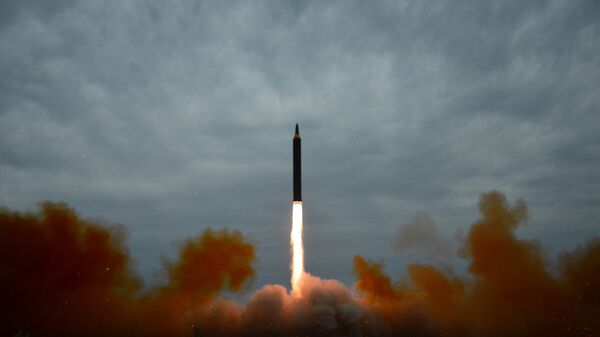Russia cannot accept Pyongyang’s "missile and nuclear gamble," which is in breach the UN Security Council resolution, and insists on the "implementation of of other provisions of these resolutions that require the resumption of talks", jointly with China, Russian Foreign Minister Sergei Lavrov stated during a press conference following talks with his Japanese counterpart Taro Kono.
READ MORE: South Korean Spy Agency: North Korea's Next Nuclear Test ‘Is Possible Any Time'
In light of the heightening tensions around North Korea's nuclear program, the diplomat also expressed concern over the intentions of the United States to deploy elements of its global missile defense system in the Asia Pacific region.
“We pointed out to our partners that the attempts to flood the region with armaments, military equipment, and overall militarization of this region under the pretext of deterring the North Korean nuclear threat were unacceptable. We believe that the measures which are taken by the United States and its allies in the region are completely disproportionate to what has to be done,” Lavrov said.
In response Japanese Foreign Minister Taro Kono said that the purchase of the US anti-missile defense systems by Japan is not a threat to the country’s relations with Russia, since it is related solely to the threat posed by North Korea.
READ MORE: Russia, China to Hold Drills Practicing Response to Ballistic Missile Strikes
In addition, Sergei Lavrov has expressed hope that the way out of the "spiral of confrontation" will eventually be found and the parties will be able to resume negotiations.
Russia and China have repeatedly voiced their concerns over the increased number of military exercises in the region and reiterated calls to solve the North Korean issue via dialogue.
READ MORE: Trump's Claims About Double Freeze Plan Rejection Have No Confirmation
The double freeze plan proposed by the countries is designed at creating the conditions for negotiations between Seoul and Pyongyang, in the course of which the two parties should agree on the basic principles for the interstate relations, including the non-use of force and engagement to work toward the denuclearization of the Korean Peninsula. However, the US dismissed the suggestion as "insulting", whereas South Korea is yet to provide a response.



